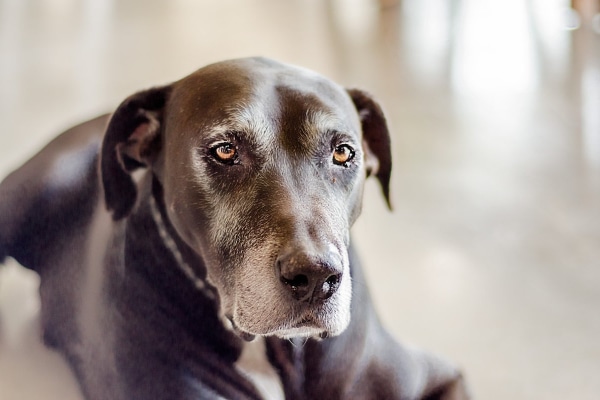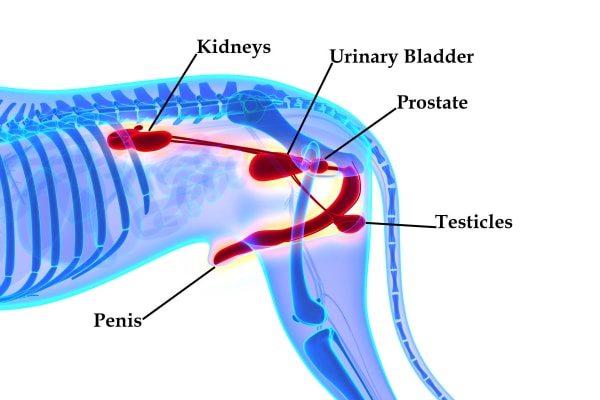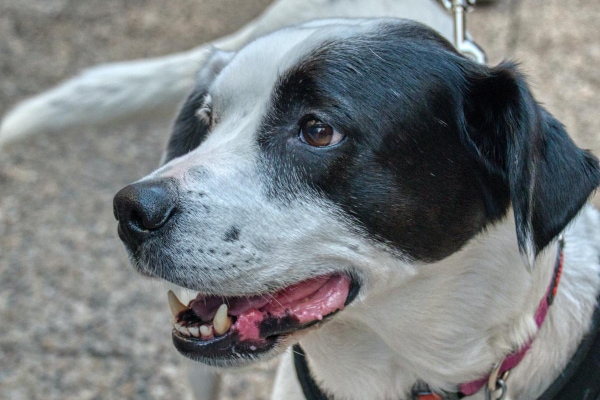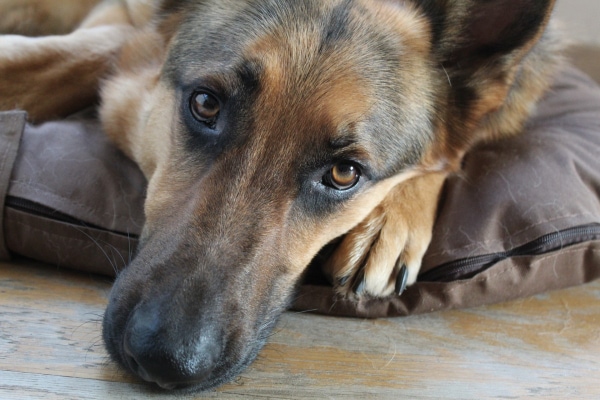An enlarged prostate in dogs is fairly common in male senior dogs. But how big a deal is it? Integrative veterinarian Dr. Julie Buzby shares why an enlarged prostate typically points to one of three conditions, which have variable outlooks. Learn about these conditions as well as the symptoms and treatments.

Did you know that routine prostate exams aren’t just for older men? They can be a good idea for male dogs too! You see, dogs do have prostates. And intact or castrated male dogs are prone to several conditions that lead to prostatomegaly (i.e. an enlarged prostate). Some are a big deal for your dog (no pun intended) while others may or may not ever cause noticeable issues.
I promise I will fill you in on the details of the top three causes of prostatic enlargement in dogs. But first, let me set the stage by explaining a bit more about the prostate.
What is the prostate?
Like male humans, male dogs also have a prostate gland. This oval-shaped structure has two lobes and sort of looks like a walnut. It is responsible for producing prostatic fluid, which contains nutrients that enhance the metabolism of sperm cells. This fluid also helps sperm survive when they move through a female dog’s reproductive tract after breeding.
Conveniently, the prostate surrounds a portion of the urethra and has multiple ducts that deposit prostatic fluid into the urethra. Plus, the vas deferens (i.e. tube that carries sperm cells from the testicle to the urethra) travels through the prostate before opening up in the urethra. This anatomical arrangement allows the sperm cells to mix with the prostatic fluid during ejaculation.
However, as you will soon discover, there are some aspects of prostate anatomy that become less ideal once the prostate enlarges. Normally, the prostate wraps around the portion of the urethra that first exits the bladder. It is boxed in by the bladder in front of it, rectum above, pelvic bones below, and abdominal wall on either side.

With a normal-sized prostate, these physical boundaries aren’t a problem. However, as you can imagine, when the prostate begins to grow in size, it doesn’t have a lot of places to go. This helps explain some of the clinical signs you might see if your dog has an enlarged prostate.
What are the symptoms of an enlarged prostate in dogs?
Since the enlarged prostate sometimes compresses the urethra or the rectum, affected dogs may show signs that relate to those body systems. Symptoms may include:
- Straining to urinate or difficulty urinating—You may notice your dog posturing for a prolonged period of time and only producing a small amount of urine.
- Frequent urination—If your dog can’t get much urine out at a given time, he may try to urinate more frequently to compensate.
- Changes in urine volume—The dog may only produce a small stream of urine or a few drops of urine at a time.
- Blood in the urine—Sometimes the urine may contain swirls of blood or be a reddish pink color.
- Bloody discharge from the urethra—You may notice some bloody material at the opening of your dog’s prepuce (i.e. the skin covering the penis).
- Urinary incontinence—You may find spots of urine around the house or your dog might leak urine.
- Straining to defecate or difficulty defecating—The dog may stay in the position for longer than normal but not produce much stool.
- Abnormal stools—The feces may be thin or ribbon-like or of a smaller volume than usual.
- Weight loss—You might notice that your dog looks thinner.
- Fever—If an infection is to blame, your dog might be running a fever.
- Abdominal discomfort or pain—Your dog might stand in an abnormal position (e.g. hunched or stretched out) or be reluctant to let you touch his belly.
- Being a lethargic dog—Your dog might lay around more or not want to participate in normal activities.
- Stiff gait—Pain in the abdomen or spine can make your dog walk with a stiff gait.
- Nausea—You may notice your dog keeps licking his lips or drooling, which are signs of nausea.
Seek veterinary care if you see these symptoms
Understandably, dog parents may assume their dog is constipated, or has a (UTI in dogs) or pyelonephritis in dogs (i.e. kidney infection) since many of the symptoms of an enlarged prostate resemble these conditions. However, this isn’t always the case. So if you notice any of these signs, it’s always best to make an appointment with your veterinarian.
Should your dog be unable to urinate, take him in for an emergency vet visit immediately. Urinary obstruction from an enlarged prostate (or other causes) can be dangerous.
Please note that the exact symptoms of an enlarged prostate can vary greatly depending on the dog, disease, and severity of the condition. Some dogs may be asymptomatic while others are gravely ill.
How will my vet find the reason for my dog’s enlarged prostate?
During the vet visit for a symptomatic dog, or if your vet is evaluating your dog’s prostate at a wellness visit, he or she will probably start by performing a digital rectal exam to assess the size and shape of the prostate. This is a quick and easy way to confirm prostatic enlargement for many dogs. However, it is a bit trickier for large and giant breeds since their size means the prostate is further away from the anus.
If the vet needs to gather more information about the prostate, he or she may recommend some imaging. This may involve an X-ray to confirm prostate enlargement, look at the overall shape of the prostate, and screen for cancer spread. Or the vet may suggest an abdominal ultrasound, which is especially useful for detecting prostatic abscesses, cysts, or tumors.
The vet may also want to run blood tests for dogs to look for increased white blood cells (a sign of infection), or perform urine tests. Additionally, he or she may recommend cytology or a biopsy of the prostate to look for signs of infection or cancer.
The vet will then use all of this information to try to pinpoint the cause of your dog’s enlarged prostate.

Top 3 causes of enlarged prostate in dogs
The three main causes of prostatic enlargement in male dogs (intact or castrated) that your vet will be looking for include:
#1: Benign prostatic hyperplasia
As intact male dogs become middle-aged or older, their hormones can cause the prostate to grow larger. This natural process is called benign prostatic hyperplasia (BPH) and it affects roughly 80% of non-neutered older male dogs. As such, BPH is the most common cause of an enlarged prostate in dogs.
Here’s how it happens. In intact male dogs, the hormone testosterone (made primarily by the testes) is converted to dihydrotestosterone (DHT). The role of DHT is to control the size of the prostate by binding to DHT receptors. As dogs age, a higher percentage of the testosterone is converted to DHT and number of DHT receptors is also increased. As a result, the number of cells in the prostate increases (i.e. hyperplasia) and the cells get bigger too. These hormonal and cellular changes translate to enlargement of the prostate.
Symptoms of benign prostatic hyperplasia
Thankfully, the majority of dogs with BPH can stay asymptomatic and healthy for many years. Some dogs with BPH, however, can have the following complications:
- Urinary signs or constipation (e.g. the dog may strain to defecate or urinate)
- Increased risk of prostate infection or inflammation (i.e. prostatitis) because prostatic fluid is a good medium for the growth of bacteria
- Increased risk of the formation of prostatic cysts (i.e. pockets of fluid in the prostate)
- Decreased motility and integrity of sperm in breeding males, which can lead to infertility
Treatment of BPH
Although it often doesn’t require treatment, BPH is arguably the simplest prostatic disorder to manage long-term. All you need to do is schedule a neuter surgery for your canine companion. Removing the testicles (and therefore the source of testosterone), will cause an enlarged prostate to start to shrink down.
Typically, the prostate will shrink by 50% by three weeks post-neuter and by over 70% by nine weeks post-neuter. If for some reason it doesn’t, then one of the other processes we are about to discuss may be at play as well.

Alternatively, there are some medication options which may also help shrink the prostate if a dog is symptomatic. One such medication, Finasteride (Proscar®), is useful for breeding dogs because it blocks the conversion of testosterone to DHT but does not decrease testosterone levels. It is worth noting, though, that clinical signs tend to reoccur after stopping the medication.
#2: Prostatitis
In unneutered male dogs, prostatitis (i.e. inflammation of the prostate gland) is the second most common cause of an enlarged prostate. It tends to affect intact male dogs or recently neutered dogs. And it is most common in dogs over three years of age. However, this prostatic disease is rare in neutered male dogs.
Typically, prostatitis occurs when bacteria migrate up the urinary tract and enter the prostate gland. This may happen in conjunction with BPH because of the changes in the prostate anatomy and the fact that prostatic fluid is a good bacterial growth medium.
However, it can also happen independent of BPH. Any disorder that predisposes a dog to developing a urinary tract infection can also cause prostatitis. Examples of these disorders include:
- Bladder stones and urethral stones
- Urethral stricture (i.e. narrowing of the urethra)
- Any trauma or injury affecting the urogenital tract
- Bladder cancer in dogs (e.g., transitional cell carcinoma or TCC)
The most common bacteria implicated in cases of prostatitis is E. coli. However, several other bacteria can also cause prostatic infections, as can some fungal agents.
Symptoms of prostatitis in dogs
Prostatic infections can be acute or chronic in nature, with chronic bacterial prostatitis being more common.

When there is an acute onset of prostate infection you may see the general symptoms of an enlarged or swollen prostate that we discussed earlier, plus:
- Fever
- Lethargy
- Decreased appetite
- Vomiting
- Abdominal pain or lower spinal pain
- Trouble holding their urine
- Blood and discharge that can be observed coming from the penis
On the other hand, dogs with a chronic infection may not have any symptoms. Or they may appear to have a UTI or constipation.
Unfortunately, some acute or chronic prostatic infections can also result in the formation of a large prostatic abscess. If the abscess ruptures or goes untreated it can cause a significant body-wide infection (i.e. sepsis). Sepsis can be very difficult to treat and may be life-threatening.
Treatment of prostatitis in dogs
The vet will use a four to six week (or longer) course of antibiotics to treat a prostatic bacterial infection. Often the vet will base antibiotic selection on the results of a culture and sensitivity.
If your dog has a prostatic abscess, the vet may also need to drain it to help avoid the abscess accidentally rupturing into the abdomen. There are a variety of drainage methods including intracapsular prostatic omentalization surgery and ultrasound guided drainage.
Your vet may also prescribe additional medications such as non-steroidal anti-inflammatory drugs (NSAIDs) and stool softeners to help with inflammation and constipation, respectively.
Ideally, intact dogs with chronic prostatitis (and sometimes acute prostatitis) would also be neutered. This can help shrink the prostate and decrease the chances of continued prostatitis. However, if you intend to breed your dog, there are some medications available (e.g. Finasteride) which can reduce prostatic size yet won’t affect breeding capability.
3. Prostate cancer
Like other areas of the body, it is possible for tumors to develop within the prostate gland. Overall, prostate cancer in dogs makes up about 5-7% of cases of prostatic disease in dogs. This means it is much less common than BPH and prostatitis.
The most common type of prostatic cancer is adenocarcinoma. However, other tumor types are also possible. Unfortunately, prostatic cancer is rarely benign and it tends to have high metastatic rates. This means that the tumor cells can quickly move to other parts of the body, resulting in a poor response to therapy.

Interestingly, genetics may play a role in the development of prostate cancer in dogs. Researchers have isolated a mutation in the BRAF gene which seems to occur in a majority of urogenital cancers. Luckily, there is a simple test that can look for the mutated BRAF gene in the urine sample of a dog.
The other risk factor that researchers are still exploring is reproductive status, as prostate cancer appears to be more common in neutered males. This may be because sex hormones have a protective effect on prostatic cells. However, these studies also acknowledge that neutered dogs have a longer lifespan compared to intact males. This may put them at an increased risk of cancer developing simply because they are alive for longer.
Symptoms of prostate cancer in dogs
Prostatic cancer can cause all the typical symptoms of an enlarged prostate that we have already discussed. But painful or difficult urination (i.e. dysuria) and straining to urinate (i.e. stranguria) are more commonly seen with prostatic tumors. In the later stages, a dog may be completely unable to urinate. Or he may experience spinal pain, difficulty walking, or other signs of tumor spread.
Treatment of prostate cancer in dogs
Dogs with prostatic cancers may require partial or total surgical removal of the prostate, radiation therapy, chemotherapy, or other modalities. Additionally, oral NSAIDs like piroxicam may help keep affected dogs comfortable and have some anti-tumor effects. Yet even with these treatments, sadly, the prognosis can still be guarded to poor.
Treatment for enlarged prostate in dogs
As you have learned, treatment for enlarged prostate in dogs will depend on why the prostate was enlarged in the first place and how severe your dog’s symptoms are. Since the treatment for a hormone-driven condition like BPH is different than the treatment for cancer, there isn’t a one-size-fits-all approach for managing prostate enlargement in dogs. Instead, your veterinarian will design a treatment plan specific to your dog’s condition.
Are there home remedies or natural treatments for an enlarged prostate in dogs?
After learning about the three most common reasons for an enlarged prostate and the medical treatment options for each condition, you may be wondering if there is anything else you can be doing for your dog. Typically, there isn’t a natural treatment or home remedy that is going to be as effective as what your vet can offer. However, taking a holistic approach, in addition to working with your vet, can be helpful.
For example, by keeping your pup on a complete and balanced diet, you are ensuring that his immune system will have everything he needs to fight infection and minimize inflammation. Additionally, supplements that contain glucosamine, chondroitin, omega-3 fatty acids for dogs, and vitamin C are often helpful. These ingredients naturally decrease inflammation in the body, especially throughout the urogenital tract. Plus, vitamin C may also help decrease the chances of a bacterial infection.

Talk to your veterinarian
One of the biggest things I hope you take away from this article (and most of my articles really) is to work closely with your veterinarian when making decisions for your dog’s health. If you don’t know if or when you should neuter your dog because BPH and prostatitis are common in intact males but prostate cancer may occur in neutered males more often, talk to your veterinarian.
If you are noticing concerning symptoms and wondering if your dog has an enlarged prostate, talk to your vet. And if your dog does have an enlarged prostate—you guessed it—keep talking to your vet. Lean on his or her expertise to figure out the cause and next steps so you can get back to enjoying life with your senior dog ASAP.
And let me offer one final word of advice—even if your dog seems totally healthy, keep up with wellness visits. That way your dog can get a much-needed routine prostate exam to check for prostate enlargement. Like everything else, early detection of prostate problems can make a difference!
Did your dog have an enlarged prostate?
Please share your experiences below.


My small dog Spartacus had blood coming from his penis and our vet said it was his prostate. put him on antibiotics and said if it comes back, he may need to be neutered …. What herbs could I get for him to help….. ? And should I get him neutered right away?
Hi Tina,
I understand your concern for Spartacus with this new urinary issue he has developed. While neutering will definitely help if the prostate is enlarged due to hormonal effects, there are other conditions that can lead to the prostate becoming enlarged that may need more in-depth investigation to reach a diagnosis. I am not sure what herbs would be helpful in this situation. Hoping the antibiotics will offer a quick and easy resolution. Feel free to leave an update and let us know how things are going.
We have a 4 yr old intact purebred Great Pyrenees who was diagnosed with an enlarged prostate and was put on Zeniquin for 10 days and neuter surgery was recommended. My concern is whether he will become more aggressive or have other personality changes after his surgery. The enlargement is not deemed to be cancerous but infections. What are other options besides the neuter surgery that are helpful in correcting this condition? Thanks.
Hi Heidi,
I am sorry your boy is facing this new diagnosis. Luckily neuter surgery is a fairly easy fix and is the best way to resolve this issue. Neutering a male dog is one way to reduce aggressive behaviors so I definitely would not expect it to increase aggression. I have neutered every male dog I have ever owned and never noticed any type of personality change. Hoping you can find the answers you need to make these important decisions about your dog’s health. Wishing you both all the best.
My just turned 9 yo intact Goldendoodle has recently had 3 -4 uti or prostate infections. They clear up after antibiotics but I know it’s not good to keep treating infections chronically. His prostate is enlarged. If we neuter, I have questions as to what effects I’ll see on him: (1) will he be as interested in smelling and marking? Now his favorite part of the day is sniffing and marking while on his neighborhood walks. (2) will his energy go down? He is 9 years old and has great energy, He also still loves to play.. But is his youthful energy because he still has testosterone? Will his energy go down after neutering?
Hi Valerie,
I am sorry your senior guy is struggling with recurring prostate issues. It is likely your boy will still display urine marking behaviors as this can be a learned behavior even if it is no longer hormone driven. Dogs like to sniff and smell regardless of their reproductive status. Neutering will not have an effect on his energy or willingness to play. Hopefully this will put your mind at ease and allow you to get your pup the treatment he needs to stay healthy for many years to come. Best wishes and take care!
second time to the vet in a few months for my baby boy. 6 year old aussie husky pit mix. he has genetic markers for urates which was initially my concern of blockage. a cath indicated no blockage but trouble moving further down. as before he showed an enlarge prostate. determined that was the issue this time as well. my vet recommends neutering which in very on the fence about for lack of knowledge. I’ve seen plenty older dogs intact. my fear is putting him under with the various meds that it will increase his risk for cancer. someone told me once that cats being put under anesthesia develope cancer more? not a cat person but it was more information for my brain to overthink about. I just want my baby boy to live the longest life possible which I hope to achieve with home cooked foods, no chemicals in the household such as harsh cleaners. i do everything i can to do right by my animals. I will circle back again to my fear of removing his doodads and taking away from his lifespan be it from cancer or side effects of medicines. please help steer me in a better direction.
Hi Amanda,
I understand your concern for pup and think it is great you are trying to understand the information before making a big decision. It would be good to determine if the enlarged prostate is benign hyperplasia or if it is prostate cancer. Benign hyperplasia is more common in intact males, and it is usually hormone responsive. This means, the quickest and safest way (no long-term medications or chemical treatments) to resolve the issue is to neuter the dog. Once the testosterone is out of his system, the prostate should shrink back to normal size and the problem can completely resolve. One anesthesia event is much less worrisome than trying to daily manage prostate and urinary issues with medications and therapies. Ultimately, you have to do what you are most comfortable with, and I am certain you have your boy’s best interest at heart. Wishing you all the best and praying for a positive outcome for your sweet boy.
Hi Dr. Buzby,
Our pup, a beagle, is 10.5y. He was neutered when he was 1yr old.
4weeks ago he was seen by a vet for recurring peeing accidents. On ultrasound and from urine analysis, prostate was enlarged and bacteria found in urine. First course of treatment was NSAIDS and antibiotics then recheck in 1week. At the 1week appointment, prostate was looking better (less enlarge and no abscess), also symptoms were gone. Treatment was antibiotics for another 2weeks then 2nd recheck. Today was his 2nd recheck and the prostate is still looking enlarged although he is otherwise asymptomatic. At this point, the vet suggested we do the BRAF test for prostate and bladder cancer. Would ultrasound or xray of liver/kidney etc be more effective and faster at reaching a cancer diagnosis (assuming metastatic lesions are found) and then getting an oncology referal instead of waiting on BRAF results which im not sure how sensitive it is and also somewhat costly?
Thank you
Hi Alexandra,
I am sorry your senior boy is facing this uncertain future. In this situation, I am not sure that one choice is better than another. I might proceed with the BRAF test (as the oncologist will probably recommend this as well) and go ahead and work on getting a referral. Referrals can sometimes have a long waiting period and I would hate for everything to be on hold if you could be getting some answers in the meantime. Ultrasound is great but can’t always give definitive answers about cancer or malignancy. A biopsy or other tissue sample may be needed to reach a diagnosis. How are things today? Were you able to get some answers for your pup? Hoping all is well and your Beagle is on the road to recovery. Feel free to leave an update if you have a chance.
Hi, my 11 year old cockapoo, (entire) has been diagnosed with an enlarged prostate today , he’s had bloods that all came back as good , and I’ve been advised to have a prostate wash so that cells can be checked for any nasties, I’m struggling to take it all in at the minute, as pretty broken hearted , but I wondered if you could advise if chemical castration or neutering would be the best option , when his results come back ..we are in the uk, any advice would be great , he’s raw fed and we’ve managed to avoid chemicals up till now , as he reacts quite badly to them ..I refuse to think anything other than positive for him right now.. he’s my whole world ..thanks
Hi Erica,
I am sorry your boy is facing this unknown future. It is great your vet is taking such a proactive stance and is offering such in-depth testing. I cannot really speak to the benefits or risks of chemical castration verses neutering as chemical castration is really not performed here in the U.S. I recommend neutering to all my patients with an enlarged prostate and have great success with the procedure. Hoping the test results will be favorable and praying your boy can make a full recovery. Wishing you both the best for many happy days ahead. Feel free to keep us updated with new information!
Hi, would be interested to know how you proceeded. My entire dog has an enlarged prostate diagnosed with ultrasound. BRAF urine test thankfully returned negative. He was chemiccally castrated a week ago (chip) and we are hoping for an improvement soon. The blood is the most worrying part. Quite a lot in urine and drips too.
Hi Helen,
I am sorry your boy is struggling with an enlarged prostate. What a blessing the BRAF test was negative! Praying for healing and a positive outcome.
I have a intact 14yr old miniture poodle, I’ve had since he was 9wks,Has always kept up on wellness exams and shots but had never been had his prostate exam, I had noticed him having difficulty pooping,vet did anal glands expressed, I continue to notice he was still having difficulty, and not eating as much now has found him to have enlarged prostate, and was given this estimate which includes labs and X rays, I couldn’t afford all at the same time,started with labs which costed almost 200 dollars, and antibiotics and galliprant, after completing all meds,I returned to vet with same complaints, this time I paid for X-rays now advised to neuter him,and more labs first, I’m concerned due to his age, I know any surgery comes with risks,is the risk higher because of his age, I’m afraid he is like child, I raised him and taken care of him along with my children, I can’t put my trust in the vet they haven’t been as informative as they should have, it appears that they are more about the money,having me to pay for the same labs, and me having to bring him back when they could have checked his prostate the first time, and having me to have to bring him back for the same complaints,I never knew about the health reasons for having him neutered , I only knew about him mateing, otherwise I would have done long ago, Now to find out this is something that could have been avoided, and that I had control of keeping this from happening, Now I could possibly be putting him at risk because he is a senior, I’m really afraid how much of a risk,any suggestions or advice will be greatly appreciated
Thanks,
Kathy Acacia
Hi Kathy,
I am sorry your senior guy is dealing with these issues. I understand your concern and hope I can offer some insight. Without examining your pup, myself, I can’t say for sure if he is a good surgical candidate. Age alone is not necessarily a risk factor and blood work is definitely needed to assess his anesthesia risk. I know you mentioned he had some lab work done previously, but things change quickly and sometimes tests have to be repeated. Also, there may be certain tests that are needed before surgery that are not included on routine wellness panels. This could be why your vet is recommending additional lab work. I assure you your vet is NOT in this for the money. It can be tricky to get a definitive diagnosis and sometimes answers only come after a lengthy investigation has been performed. I am sorry you feel as though the communication from your vet has not been ideal. I encourage you to reach out to them and discuss your concerns. Ask your questions and try to see the whole picture. If you truly are not satisfied, it is ok to seek services elsewhere. Not every clinic is the right fit for every client. You deserve to get your dog’s medical care from someone you can trust and feel confident in their decisions. Here are links to articles with more information:
1. Is My Dog Too Old for Surgery?
2. Is My Dog Too Old For Anesthesia?
Hoping you can find the answers you need to make the best decision for everyone involved. Wishing you and your sweet boy nothing but the best!
I have a 13 year old 85lb Boxador with enlarged prostate and is not neutered. He is frequently incontinent at night. He also gulps his water and food and gas and coughs afterwards. He breathes heavy after climbing steps. Is it safe to have him neutered?
He has arthritis as well so he has difficulty with physical activity. I am concerned he may have heart problems and Diabetes the way he drinks and breathes.
Hi Bette,
I am sorry your senior guy is dealing with the effects of an enlarged prostate. I understand your concerns about surgery/anesthesia and think it is good you are reaching out for advice. The only way to know if your boy is a good surgical candidate is to do some lab work and testing. I always recommend presurgical lab work to minimize risks and get an understanding of how the organ systems are functioning. Your vet will do an exam and can let you know which tests would offer the most benefit for your dog’s specific medical needs. The lab work and exam should be able to offer some insight on your dog’s heart health and whether diabetes is a possibility or not. Hoping this will help point you in the right direction. Best wishes to you and your sweet boy.
My old 13 year dog is 13-15 pounds and was prescribed 0.35 a day of ferstermide in liquid form for enlarged prostate. Its not working, what is the normal dose? My vet said she didnt know much about the medicine and has never prescribed it was wondering of it can be increased.
Hi Paul,
I too have never prescribed Finasteride to a patient before. For a dog that has been diagnosed with benign prostatic hyperplasia, I have always recommended having the dog neutered (if still intact) as this should take care of the problem. Is there a reason you are trying to avoid neutering your pup? Also, other issues such as prostatitis and prostatic cancer would need to be ruled out. Without being personally involved in your dog’s medical care I can’t make dosing recommendations. I am not sure if the 0.35 you mentioned is milliliters or milligrams. This could make a huge difference. There is a bit of wiggle room when it comes to the acceptable dosage for Finasteride. I just don’t have enough information to tell where in that range your dog’s dose falls. I think it would be best to talk to your vet and discuss your concerns. Let them know you are not seeing the results that were expected. I am hopeful you will find the best way to restore your sweet boy’s quality of life. Best wishes and good luck!
my dog was neutered by the shelter at 4 months old. He is now 10 years old with an enlrged prostate. He is undergoing a needle biopsy today, but this news is devastating.
Hi Cynthia,
I am so sorry your senior boy is facing this difficult situation. Praying the biopsy will be successful and you can get the results you need to find a clear path forward with treatment. Feel free to reply with any new updates. Wishing you and your sweet boy the best.
Hello,
I adopted my dog almost two years ago from the Animal Care Center. He is now about 16 years ago+.. He is a .Yorkshire .mix about 10 pds. (7 pds when I got him). He was not neutered and too old to be neutered now. He has been bleeding from his penis on occasion, maybe twice a month, sometimes not at all for the rest of the months. Otherwise he is healthy, getting old, some blindness, slowing down, sleeping more.
What should I do?
Thank you very much.
Hi Marilyn,
I am sorry your senior guy is experiencing these bleeding episodes. I strongly encourage you to have him examined by your vet and pursue testing to get a diagnosis. There are many different possible causes, and some have a fairly easy treatment. Also, I can understand why anesthesia would have you concerned, but age alone is not a reason to forgo surgery to have your boy neutered. As long as the necessary lab work and tests are done prior to the procedure and all the results are favorable, your boy may still be a good anesthesia candidate. Here is an article with more information: Is My Dog Too Old for Surgery?
Hoping you can get the answers you need to make the best choice for your sweet boy. Best wishes to you both!
My 14 yr old male dog has been going through the exact same. Bleeds from penis couple times tehn went a whole 12 momths with no blood but now back. Did say its possible enlarged prostate so gave meds for that but he bled again so now possible ultra scan. So im wondering did you get any answers or diagnosis for your boy? X
My 14 yr old male dog has been going through the exact same. Bleeds from penis couple times tehn went a whole 12 momths with no blood but now back. Did say its possible enlarged prostate so gave meds for that but he bled again so now possible ultra scan. So im wondering did you get any answers or diagnosis for your boy? X